May 21, 2014
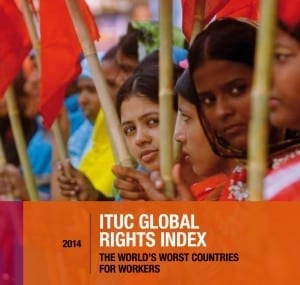 Uruguay, South Africa and Germany are some of the countries with the best worker rights records in 2013, while Cambodia, Guatemala and Nigeria are among the worst, according the 2014 Global Rights Indexreleased this week by the International Trade Union Confederation (ITUC).
Uruguay, South Africa and Germany are some of the countries with the best worker rights records in 2013, while Cambodia, Guatemala and Nigeria are among the worst, according the 2014 Global Rights Indexreleased this week by the International Trade Union Confederation (ITUC).
The annual index, which documents violations in 139 countries recorded between April 2013 and March 2014, found that in the past 12 months:
- Murder and disappearance of workers were commonly used practices to intimidate workers in at least nine countries.
- Governments of at least 35 countries have arrested or imprisoned workers as a tactic to resist demands for democratic rights, decent wages, safer working conditions and secure jobs.
- Workers in at least 53 countries have either been dismissed or suspended from their jobs for attempting to negotiate better working conditions. “In the vast majority of these cases,” the report notes, “national legislation offered either no protection or did not provide dissuasive sanctions” to hold abusive employers accountable. Rather, “employers and governments are complicit in silencing workers’ voices against exploitation.”
- Laws and practices in at least 87 countries exclude certain categories of workers from the right to strike. At least 35 countries impose fines or even imprisonment for legitimate and peaceful strikes.
The most frequent violation of worker rights occurred when workers went on strike, followed by violations of the rights of workers who sought to join unions.
The survey notes that because countries such as Qatar and Saudi Arabia exclude migrant workers from labor rights, more than 90 percent of the workforce effectively has no recourse for addressing forced labor practices which exist under archaic sponsorship laws.
“The World Bank’s recent ‘Doing Business’ report naively subscribed to the view that reducing labor standards is something governments should aspire to,” said Sharan Burrow, ITUC general secretary. “This new Rights Index puts governments and employers on notice that unions around the world will stand together in solidarity to ensure basic rights at work.”
The index assigns each country a score ranging from one to 5+, with 5+ indicating no guarantee of worker rights due to a complete breakdown in a country’s rule of law (for example, the Central African Republic and Ukraine), five indicating no guarantee of worker rights (for example, Bangladesh, Colombia, Malaysia) and “one” signaling that collective labor rights are generally guaranteed.
The report also offers a detailed look at six countries, one from each of the rankings: the Central African Republic, Cambodia, Kuwait, Ghana, Switzerland and Uruguay.
The ITUC Global Rights Index ranks the 139 countries against 97 internationally recognized indicators to assess where workers’ rights are best protected in law and practice.

May 16, 2014
On a late September day in the Niger Delta region of Nigeria, hundreds of women from the Egberu, Afam-Ukwu and Afam-Nta communities gathered in Oyigbo.
They had repeatedly tried to talk with the local government council about their dire need for a functional health center but had been ignored. With no health facilities nearby, access to medical care required traveling long distances, a costly expense few impoverished residents could afford, and a journey that further endangered the health of women and their children.
The women marched to the council building that day in 2011 to demand the government meet with them. The council secretary instructed security to lock the gates, but as the guards tried to barricade them, the women pushed the gates open, singing as they did.
They would be heard. Because of their persistence, the council chief of staff met with them and, at their request, asked the state to renovate and update the area’s dilapidated health clinic. The government also built a well-equipped health center at nearby Obuakpu, achievements carried out by community women empowered through a dynamic community coalition, Women Initiative for Transparency and Social Justice (WITSOJ).
Born out of necessity to combat injustices in the Niger Delta, WITSOJ is training and mobilizing women and young people to effectively engage in the democratic political process, hold local lawmakers accountable and achieve concrete goals in their communities. WITSOJ formed in 2007, after a Solidarity Center workshop in Warri, a major oil city in Delta State.
“Women from all Niger Delta states were represented, and we were asked to go back to our communities and ask for social justice,” says Dr. Jennifer Spiff, who heads the organization. Following the Solidarity Center training, more than 200 women from a variety of organizations and communities met in Port Harcourt, and from there, the coalition reached out to additional women-based organizations. Spiff was interviewed as part of a new Solidarity Center report, “Nigeria: Empowering Women, Transforming Society.”
WITSOJ works closely with the national trade union movement, especially with Women in PENGASSAN (the Petroleum and Natural Gas Senior Staff Association of Nigeria). PENGASSAN members have called for transparency in the government’s handling of profits from its vast oil reserves, demanding that oil income fund infrastructure repair and create environmentally safe refineries. The union’s deep roots in local communities adds credibility to WITSOJ. The partnership with the union “gives WITSOJ the leverage to be trusted as an organization owned by the masses,” says Spiff.
Ceciliar Anthony, a farmer who lives in the Kpor community with her husband and three children and who took part in a community campaign for clean drinking water, says “WITSOJ activities brought responses from the leaders who have made firm promises for the first time.”
As a coalition of more than 20 local organizations, WITSOJ regularly taps into the expertise of its members and has the support of clergy. WITSOJ focuses on training women in large part because “women are the most vulnerable and are on the receiving end of social injustice,” says Spiff, WITSOJ coordinator.
“WITSOJ has made women realize the need for gender equality, and that most times, women can become as good ambassadors in leadership as their male counterparts,” says Gold Minimah, an active WITSOJ member.
Victory Goodluck, a farmer from the Ihuike community who has taken part in WITSOJ workshops, agrees. “It is a good strategy to focus on women because women are instruments of change, and WITSOJ has enlightened us to know our rights and the power of women in bringing our desired vision into full manifestation.”
This article is an excerpt from the report, Nigeria: Empowering Women, Transforming Society.” The report is part of Catalysts for Change, a Solidarity Center series supported by the National Endowment for Democracy. The series features the working people, their unions and activists who are advancing worker rights and greater equity in their societies. Their experience and efforts provide real, transferable lessons for others seeking to affect positive change.
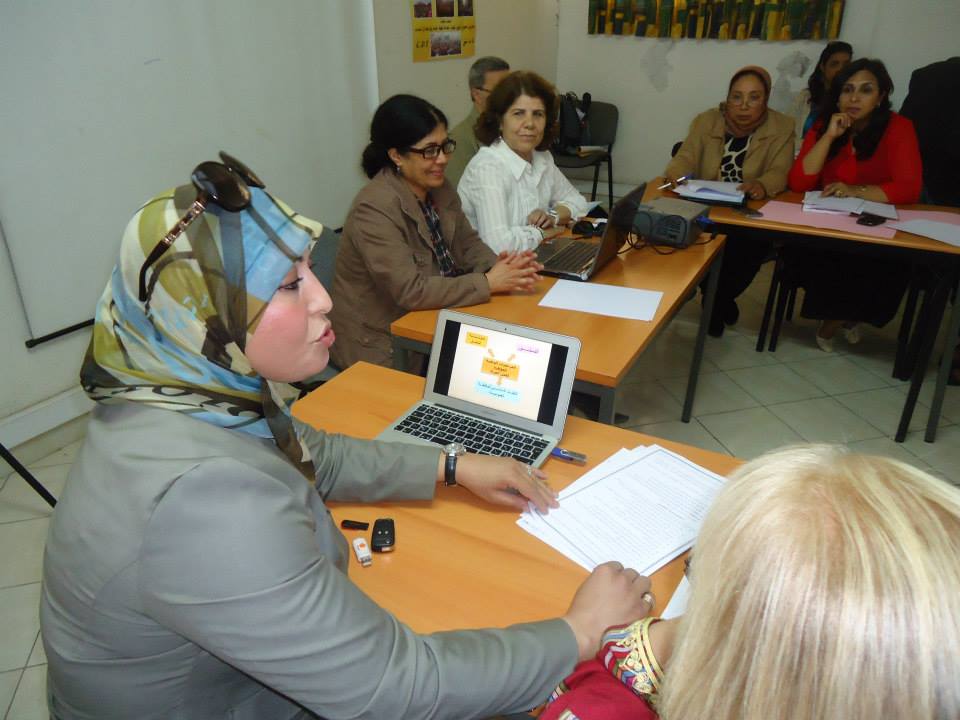
May 13, 2014
In Algeria, Tunisia and Morocco, women are taking concrete steps through unions to achieve social and economic justice and decent work, achievements possible when women are substantively involved in decision-making in their unions, their community and civil society.
In Algeria, the Women’s Committee of the Syndicat National Autonome des Personnels de l’Administration Publique (SNAPAP) has reached out to 600 marginalized and vulnerable women across 11 provinces through educational outreach and study circles. SNAPAP leadership recognizes that despite women’s active social and economic participation, they still face blatant discrimination in their workplaces and communities, harassment, violence, and exploitation on the job.
The Women’s Committee runs study circles with the Regional Algerian Women’s Legal Empowerment Network and with support from the Solidarity Center. During study sessions, the women learn their legal rights under national laws and international conventions. They also are supported in overcoming fears that keep them from challenging repression and violations of their rights, even those often condoned by their societies.
Amid ongoing global economic insecurity, millions of workers are struggling to find jobs that pay a living wage—and the most vulnerable are women, who are more likely to toil in jobs without coverage under formal labor law or social protections, leaving them open to discrimination and exploitation.
The study circles provide a safe place where women can freely talk about their experiences. In recent months, they have described ongoing exploitation in the workplace and at home. All have detailed low wages, long working hours, abusive transfers and dismissals, discrimination, sexual harassment, physical violence and a lack of social protection.
A woman union activist from Adrar, in southwest Algeria, describes how women workers struggle economically in the region, despite the country’s oil and gas wealth. To survive in Adrar, some women work in stone quarries using their bare hands to fill trucks with rocks and gravel for private sellers. Three women recently died from dehydration.
“Surprisingly, all the basic rights that women should enjoy, such as health coverage and decent living wages, are not being enjoyed by women of the south. Some women tried to change their situation through training, but their certificate of completion was rejected by all the businesses and enterprises in the south, which led women to be marginalized,” said the activist. She added that the women, “work in an unsafe environment and are vulnerable to harassment.”
In Tunisia, where women are playing a key role in enshrining articles in the constitution that guarantee equality and parity, women in the Union Générale Tunisienne du Travail (General Union of Tunisian Workers, UGTT) are now working to advance women’s roles in their union. They are uniting under the theme, “Partners in social activism, partners in decision-making,” to highlight their essential role in the country’s 2010–2011 uprising and the subsequent democratic transition. UGTT women are campaigning for creation of a quota that would ensure women comprise a minimum percentage of elected officers and members of UGTT decision-making bodies.
Women union members also have been active in UGTT’s push to remove all of the country’s reservations to the United Nations on the Convention on the Elimination on all Forms of Discrimination against Women (CEDAW). These reservations had enabled Tunisia to opt out of certain provisions, including women’s rights within the family, even though the country had ratified the treaty.
The Confederation Democratique du Travail (Democratic Labor Confederation, CDT) in Morocco is laying the groundwork for a gender advocacy campaign to ensure the consistent application and enforcement of women’s rights. The CDT’s Women’s Committee is laying the groundwork to “give more visibility to the demands of women workers.” The CDT released a memorandum, “Work is a right, with guaranteed dignity and equality,” at a well-attended press conference last month and plans a coordinated workers’ advocacy campaign for women workers.
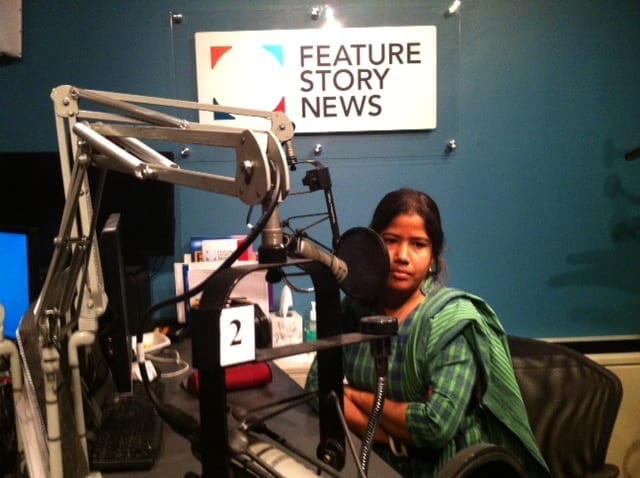
May 7, 2014
Nomita Nath gets many calls each day at the union office in Chittagong, Bangladesh, from garment workers seeking immediate assistance.
Some are locked out of factory gates by supervisors who see them as union supporters and effectively fire them. Others are faced with an employer request to sign a blank piece of paper, which is “a very dangerous thing,” says Nomita. The tactic is frequently used by factory managers to retaliate against union supporters and enables employers to write false assertions above their signatures, making it look like a worker stole money or goods or rejects the union.
No matter what the request, says Nomita, “if a fellow worker has a problem, it is my problem.”
Nomita, president of the Bangladesh Independent Garment Workers Union Federation (BIGUF), began working in garment factories at age 12, and several years later, joined with co-workers to form a union at Eastern Fashion Ltd. with BIGUF’s assistance. She was elected president of the factory union and went on to participate in BIGUF trainings and in a fire safety program organized by the Solidarity Center. She now regularly trains worker leaders and organizers on organizing methods, labor law, gender inclusion and equity and fire safety. She traveled to Washington, D.C., in recent days, where she talked with Solidarity Center staff.
The pleas for help Nomita hears from garment workers highlight the discrepancy between an environment in which unions for the first time can be registered and the resistance workers face from employers when they try to do so.
Following the Rana Plaza tragedy last year in which more than 1,100 workers were killed when the multistory building collapsed, at least 130 unions have filed for official recognition, including 42 through BIGUF’s assistance. Yet when workers try to exercise their rights for safer workplaces, they are often harassed and threatened, with some supervisors going so far as to tell landlords not to rent to workers who support a union, says Nomita. Of the 42 unions joining with BIGUF, only five so far have collective bargaining agreements because employers put up roadblocks to concluding formal pacts.
In at least two factories this year, workers seeking to form a union have been physically attacked and beaten, with union organizers the target of violence as well. Nomita understands the dangers she faces as a worker advocate in Bangladesh.
“We know and we are aware we will be threatened,” she says. “But no matter what obstacles come our way, we’ll meet them.”
Most of the 4 million garment workers in Bangladesh are women, and that poses a special challenge for organizers seeking to help workers form unions, says Nomita. Women’s “entire family, their house, is dependent on women’s jobs. They’re afraid of losing it,” she says.
Nomita is passionate about helping women overcome barriers to forming unions, which she sees as the best way for women to assert their rights as citizens equal to men.
“I am a woman and I want female workers to have rights,” she says. “I’ve watched this since I was little. They try to suppress female workers. The only way to hear a woman’s voice is through the union.”
Helping women overcome the barriers to joining a union and achieving the collective strength they need to secure safe workplaces, living wages and respect on the job is the challenge that guides Nomita each day.
“That’s my struggle,” says Nomita. “Union and unity.”
May 2, 2014
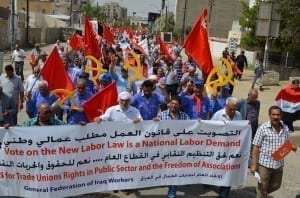
Iraqi union members rally for changes to the country’s Saddam Hussein-era labor code. Credit: Wesam Chaseb Ouda
Union members in Bangladesh, Brazil, Iraq and Morocco were among Solidarity Center allies around the world who rallied, marched in parades and protested in the streets yesterday, marking May Day and the ongoing struggle to ensure workers have a place at the table in the larger global economy and at their workplaces.
In Brazil, UAW President Bob King joined the union Força Sindical at a May Day event with some 1.3 million workers. Iraq workers and their unions marched for passage of a revised law, now under debate in Parliament. Iraqi workers are still covered by a Saddam Hussein-era labor code.
Workers in Morocco celebrated the announcement of a 10 percent boost (over two years) in the minimum wage in the public and private sectors, an action spearheaded by trade unions. The minimum retirement pension also will be boosted, and student grants will increase. Workers say many improvements still must be made, however, and in rallies across the country challenged rising prices and high unemployment and called for social security coverage for all workers and respect for collective and personal freedom.
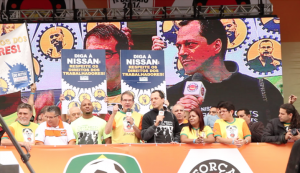
UAW Bob King (center, yellow shirt) joined Força Sindial and 1.3 million workers in Brazil. Credit: Solidarity Center
In Bangladesh, tens of thousands of garment workers turned out in events across the country. At the Jatiya Press Club in Dhaka, the capital, some 12,000 workers gathered, with many forming a human chain. Speaking at one event, Kamrul Hasan, president of Akota Garments Labor Federation, demanded workplace safety so garment workers never again die or become injured from factory fires or collapsed buildings, like Rana Plaza, which pancaked in last April, killing more than 1,110 workers.
In Gazipur, Bangladesh, women made up the majority of the 2,000 garment workers taking part in events sponsored by the Bangladesh Independent Garments Union Federation (BIGUF). Shumi, president of Masco Industries Ltd. (Knit and Composite) Workers Union, said thousands of workers turned out spontaneously this May Day to assert their rights to a union. Other Solidarity Center allies holding events include the National Garments Workers Federation’s (NGWF), the Bangladesh Garments and Industrial Workers Federation’s (BGIWF), the National Garments Workers Federation’s (NGWF) and the Bangladesh Federation of Workers Solidarity (BFWS).
 Uruguay, South Africa and Germany are some of the countries with the best worker rights records in 2013, while Cambodia, Guatemala and Nigeria are among the worst, according the 2014 Global Rights Indexreleased this week by the International Trade Union Confederation (ITUC).
Uruguay, South Africa and Germany are some of the countries with the best worker rights records in 2013, while Cambodia, Guatemala and Nigeria are among the worst, according the 2014 Global Rights Indexreleased this week by the International Trade Union Confederation (ITUC).




